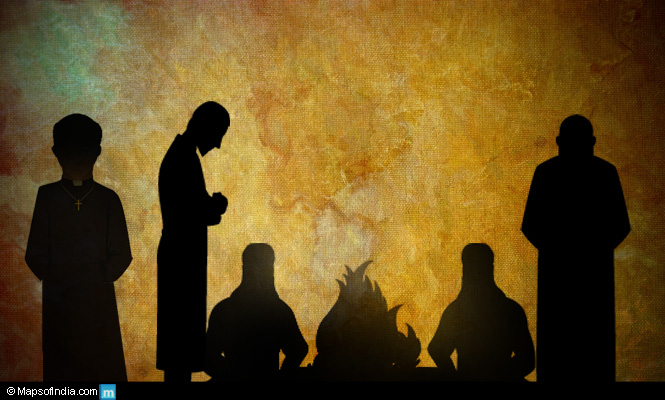 The embers of love jihad may have died down but cases of conversions continue to play havoc. The Prime Minister finds himself in a vortex of allegations and critics have stopped short of blaming him for allowing Hindu hardliners promote a Hindu-dominant agenda and lure Muslims and Christians to convert to Hinduism.
The embers of love jihad may have died down but cases of conversions continue to play havoc. The Prime Minister finds himself in a vortex of allegations and critics have stopped short of blaming him for allowing Hindu hardliners promote a Hindu-dominant agenda and lure Muslims and Christians to convert to Hinduism.
The recent uproar in Parliament over conversion of religious minorities to Hinduism brings back memories, which are discomforting. The fundamental approach towards understanding the trend of religious conversion is to assume that the truth has its grey areas.
Hardline groups say Indian Muslims and Christians were all Hindus
As the news of conversion of 130 Christians to Hinduism in Gujarat and Kerala started to create ripples in the political fraternity, the Hindu hardliners such as the RSS (Rashtriya Swayamsevak Sangh), Bajrang Dal, VHP (Vishwa Hindu Parishad) and others claimed that Indian Muslims and Christians were all Hindus who were converted to other faiths over the last few centuries.
These groups have emerged as a formidable entity that conducts ‘ghar wapsi’ (returning home or home-coming ) ceremonies to allow Christians and Muslims to return to their ‘original religion’. For them, these ceremonies are a way of bringing “back those who have lost their way.”
Religious violence in States: Different manifestations
Every religious community has made its hands dirty. At least an earnest look at the reports suggests so. The northern-most State of Kashmir has seen sporadic violence with the minority Christian population being accused of converting Muslims. In a blatant display of retribution, a Sharia court of Kashmir announced ‘Fatwa’ against Christian schools in Kashmir. It asked three priests to leave the valley with the charge that they were “luring Muslims to Christianity”.
In Uttar Pradesh, the Hindu groups have often accused Christian missionaries and Muslims of converting Dalits and poor with a lure of a better life. The irony is such that it is the fault finders who are finding themselves on the wrong side of the law. These Hindu groups had allegedly converted 50 poor Bengali Muslim families in Agra. Unfazed by widespread criticism, the hardline group Bajrang Dal threatened to launch protests if they are not allowed to go ahead with the “ghar wapsi” ceremony in Aligarh district on Christmas.
Madhya Pradesh, another State from the Hindi hinterland, grabbed the eyeballs for witnessing a case of converting members of a tribal community to Christianity by offering them jobs and free medical treatment.
The 2008 attacks against Christians in Karnataka including attacks against churches and prayer halls were believed to be the handiwork of the then ruling BJP Government. The Kandhamal riots in Odisha is another black patch in the history of the country. Many Hindu activists were accused of burning down houses belonging to the Christian community.
Agra – The hotbed for religious conversion
Only a few weeks after more than 50 Bengali Muslim families in Agra were reportedly converted to Hinduism against their will, another similar event popped out. The reports indicated that the women of Garhi Sampat village of Etmadpur tehsil have been lured by the Christian missionaries. The priests tried to gradually indoctrinate them with the teachings of Christianity by asking them to read the Bible.
The village women were told that converting to Christianity would benefit them in ways more than one. The priests hoodwinked them into believing that their children will receive subsidized education in missionary schools of Agra, Tundla and Firozabad. The women were also given the hope that their husbands will get jobs worth one lakh a year, a house or funds to construct one. Their hopes were dashed when the missionaries started forcing the husbands of these women to convert or return the money they had received.
Radicalisation of Hindu groups becoming more evident
The Dharm Jagran Samiti (DJS), the organization that has been at the forefront of ‘ghar wapsi’ programme, invited criticism as one of its functionaries echoed their objective – to free India of Muslims and Christians by 2021. He further asserted that “the Muslims and Christians do not have any right to stay here (in India). They would either be converted to Hinduism or forced to run away from here.” This remark reeked of intolerance. The very fact that these hardliners get away scot-free despite making such rabble-rousing statements is a clear indication that the State apparatus is not receiving the required support from the law enforcement bodies. Only widespread condemnations are not enough to stem this culture.
Is striking fear the main objective?
This question has been somewhat answered by the UN’s special rapporteur on freedom of religion. According to him, the acts of violence are part of a “broader pattern of instilling fear into the minorities.” These acts of conversion, according to him, convey a message that “they don’t belong to this country unless they either keep at the margins or turn to Hinduism.”
Is Modi Government going soft on Hindu hardline groups?
If there is one instance where the Modi Government is on the back foot, it has to be the issue of religious conversion. The antagonists are blatant in their allegation that the Hindu hardline groups are “flexing their muscles” under the BJP Government. Modi has been accused of “doing little” to stop his hardline supporters from forcibly converting Muslims and Christians.
The opposition is armed with examples to prove how BJP is allowing the gross undermining of India’s unity and secular values. It is sad for a nation to know that its Union Minister does not maintain civility while addressing members of minority communities. While pointing out this issue, the legendary lawyer and constitutional expert, Fali Nariman urged the National Commission for Minorities (NCM) to take action on its own.
The immediate fallout of these hate speeches is a group of enraged MPs stalling the parliamentary proceedings and preventing the Government from carrying on with its usual business. The Bill to increase foreign participation in the insurance sector could not be passed due to the persistent ruckus in both the Houses. In short, Modi’s plan to push through reforms during Parliament’s winter session was stonewalled.
In defence of religious conversion
One of the columnists, writing for Rediff, argued that religious conversion is ‘an escape route’ for the Dalits and other socially backward classes when the Government and their ‘Hindu brethren’ don’t come to their rescue. Putting a ban on religious conversion, as demanded by some sections of people, would take away this ‘privilege’ from them.
Dismissing the argument that Hindus don’t have money to counter Christian missionaries and Muslim groups who are funded by the first world nations, the columnist stated that not many people convert for money, but “for self-respect and dignity.” Arguing that the virtues of Hinduism have become dormant due to “the stranglehold of caste prejudices”, the columnist affirmed that “reform and resurgence” of Hinduism will happen only when the fear of losing its followers will shake the community leaders from within. Hence, banning religious conversion will take away the need for reform and improvement.




